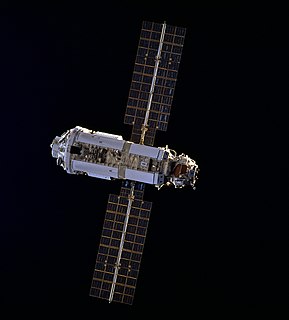Related Research Articles

The International Space Station (ISS) is a modular space station in low Earth orbit. It is a multinational collaborative project involving five participating space agencies: NASA, Roscosmos (Russia), JAXA (Japan), ESA (Europe), and CSA (Canada). The ownership and use of the space station is established by intergovernmental treaties and agreements. The station serves as a microgravity and space environment research laboratory in which scientific research is conducted in astrobiology, astronomy, meteorology, physics, and other fields. The ISS is suited for testing the spacecraft systems and equipment required for possible future long-duration missions to the Moon and Mars.

A space station is a spacecraft capable of supporting a human crew in orbit for an extended period of time, and is therefore a type of space habitat. It lacks major propulsion or landing systems. An orbital station or an orbital space station is an artificial satellite. Stations must have docking ports to allow other spacecraft to dock to transfer crew and supplies. The purpose of maintaining an orbital outpost varies depending on the program. Space stations have most often been launched for scientific purposes, but military launches have also occurred.

Schistosomiasis, also known as snail fever, bilharzia, and Katayama fever, is a disease caused by parasitic flatworms called schistosomes. The urinary tract or the intestines may be infected. Symptoms include abdominal pain, diarrhea, bloody stool, or blood in the urine. Those who have been infected for a long time may experience liver damage, kidney failure, infertility, or bladder cancer. In children, it may cause poor growth and learning difficulty.

STS-88 was the first Space Shuttle mission to the International Space Station (ISS). It was flown by Space Shuttle Endeavour, and took the first American module, the Unity node, to the station.

Zarya, also known as the Functional Cargo Block or FGB, is the first module of the International Space Station to have been launched. The FGB provided electrical power, storage, propulsion, and guidance to the ISS during the initial stage of assembly. With the launch and assembly in orbit of other modules with more specialized functionality, it's as of August 2021 primarily used for storage, both inside the pressurized section and in the externally mounted fuel tanks. The Zarya is a descendant of the TKS spacecraft designed for the Russian Salyut program. The name Zarya ("Dawn") was given to the FGB because it signified the dawn of a new era of international cooperation in space. Although it was built by a Russian company, it is owned by the United States.

The Unity connecting module, also known as Node 1, is the first U.S.-built component of the International Space Station (ISS). It connects the Russian and United States segments of the station, and is where crew eat meals together.

Tranquility, also known as Node 3, is a module of the International Space Station (ISS). It contains environmental control systems, life support systems, a toilet, exercise equipment, and an observation cupola.

Westat is an employee-owned professional services corporation located in Rockville, Maryland, USA. It provides research services to agencies of the U.S. Government, as well as businesses, foundations, and state and local governments. The corporation conducts research studies in behavioral health & health policy, clinical trials, education, public health & epidemiology, social policy & economics and transportation.
The Multiple Indicator Cluster Surveys (MICS) are household surveys implemented by countries under the programme developed by the United Nations Children's Fund to provide internationally comparable, statistically rigorous data on the situation of children and women. The first round of surveys (MICS1) was carried out in over 60 countries in mainly 1995 and 1996 in response to the World Summit for Children and measurement of the mid-decade progress. A second round (MICS2) in 2000 increased the depth of the survey, allowing monitoring of a larger number of globally agreed indicators. A third round (MICS3) started in 2006 and aimed at producing data measuring progress also toward the Millennium Development Goals (MDGs), A World Fit for Children, and other major relevant international commitments. The fourth round, launched in 2009, aimed at most data collection conducted in 2010, but in reality most MICS4s were implemented in 2011 and even into 2012 and 2013. This represented a scale-up of frequency of MICS from UNICEF, now offering the survey programme on a three-year cycle. The fifth round, launched in 2012, was aimed at offering countries the tools to do the final MDG data collection.

The International Social Survey Programme (ISSP) is a collaboration between different nations conducting surveys covering topics which are useful for social science research. The ISSP researchers develop questions which are meaningful and relevant to all countries which can be expressed in an equal manner in different languages. The results of the surveys provide a cross-national and cross-cultural perspective to individual national studies. By 2021, 58 countries have already taken part in the ISSP.

Neglected tropical diseases (NTDs) are a diverse group of tropical infections that are common in low-income populations in developing regions of Africa, Asia, and the Americas. They are caused by a variety of pathogens, such as viruses, bacteria, protozoa and parasitic worms (helminths). These diseases are contrasted with the "big three" infectious diseases, which generally receive greater treatment and research funding. In sub-Saharan Africa, the effect of neglected tropical diseases as a group is comparable to that of malaria and tuberculosis. NTD co-infection can also make HIV/AIDS and tuberculosis more deadly.

The Pressurized Mating Adapter (PMA) is a class of spacecraft adapters that convert the Common Berthing Mechanism (CBM) used on the US Orbital Segment to APAS-95 docking ports. There are three PMAs located on the International Space Station (ISS); the first two were launched with the Unity connecting module in 1998 aboard STS-88, and the third was launched in 2000 aboard STS-92.
The Demographic and Health Surveys (DHS) Program is responsible for collecting and disseminating accurate, nationally representative data on health and population in developing countries. The project is implemented by ICF International and is funded by the United States Agency for International Development (USAID) with contributions from other donors such as UNICEF, UNFPA, WHO, and UNAIDS.

Peter Jay Hotez is an American scientist, pediatrician, and advocate in the fields of global health, vaccinology, and neglected tropical disease control. He serves as founding dean of the National School of Tropical Medicine, Professor of Pediatrics and Molecular Virology & Microbiology at Baylor College of Medicine, where he is also Director of the Texas Children's Hospital Center for Vaccine Development and Texas Children's Hospital Endowed Chair in Tropical Pediatrics, and University Professor of Biology at Baylor University. Hotez served previously as president of the American Society of Tropical Medicine and Hygiene and is a founding Editor-in-Chief of PLOS Neglected Tropical Diseases. He is also the co-director of Parasites Without Borders, a global nonprofit organization with a focus on those suffering from parasitic diseases in subtropical environments.
The Health Survey for England (HSE) is a statistical survey which is conducted annually in order to collect information concerning health and health-related behaviour of people living in private households in England.

The US Orbital Segment (USOS) is the name given to the components of the International Space Station (ISS) constructed and operated by the United States National Aeronautics and Space Administration (NASA), European Space Agency (ESA), Canadian Space Agency (CSA) and Japan Aerospace Exploration Agency (JAXA). The segment currently consists of eleven pressurized components and various external elements, all of which were delivered by the Space Shuttle.

The National Health and Family Planning Commission of the People's Republic of China (NHFPC) was a cabinet-level executive department under the State Council which is responsible for providing information, raising health awareness and education, family planning, ensuring the accessibility of health services, monitoring the quality of health services provided to citizens and visitors in the mainland, population and family planning in the People's Republic of China. In March 2018, the ministry was dissolved and its functions were integrated into the new agency called the National Health Commission.
The National Survey of Family Growth (NSFG) is a survey conducted by the National Center for Health Statistics division of the Centers for Disease Control and Prevention to understand trends related to fertility, family structure, and demographics in the United States.

The International Docking Adapter (IDA) is a spacecraft docking system adapter developed to convert APAS-95 to the NASA Docking System (NDS). An IDA is placed on each of the International Space Station's (ISS) two open Pressurized Mating Adapters (PMAs), both of which are connected to the Harmony module.

The Comparative Study of Electoral Systems (CSES) is a collaborative research project among national election studies around the world. Participating countries and polities include a common module of survey questions in their national post-election studies. The resulting data are collated together along with voting, demographic, district and macro variables into one dataset allowing comparative analysis of voting behavior from a multilevel perspective.
References
- ↑ "Archived copy". Archived from the original on 2015-08-21. Retrieved 2015-08-15.
{{cite web}}: CS1 maint: archived copy as title (link) - ↑ "PMA2020 Q&A: Sparking a Data Revolution for Family Planning". www.globalhealthnow.org. Archived from the original on 2015-10-19.
- ↑ "PMA2020 receives gift to fund Schistosomiasis module". Johns Hopkins University. Retrieved 6 May 2016.